Community Environment Health & Wellness
In the Margins | Spring has sprung: Rely on a guide when entering gardening purgatory
Every spring, my love-hate relationship with gardening comes into full bloom with all the ferocity of a Pacific Northwest pine pollen storm.
Community Sponsor
Community stories are made possible in part by Peninsula Light Co, a proud sponsor of Gig Harbor Now.
Despite watery eyes and the fact that our backyard deck looks like it’s been slimed in mustard, spring is a time for renewal. It’s another opportunity to see whether 16 hours of hard labor and $200 of supplies will yield about $3 worth of cherry tomatoes in time for the family picnic in August.
In our family, gardening is both passion and purgatory. My wife embodies the passion; I stand ankle-deep in verdant purgatory, although my boots often smell more like chicken manure.
It’s not that I disdain gardening. It’s just that I don’t feel enough passion to see beyond the grunt work of shoveling, mowing, trimming, hauling and clipping. While some are energized by the act of planting new life, I am left unleashing expletives at another broken sprinkler pipe fitting. Sorry, the blinding romance of growing leafy things simply escapes me.
Spring fever hits hard
During the annual run-up to Mother’s Day, my wife undergoes a genetic chemical and biological transformation that makes the totality of a solar eclipse seem mundane. Her eyes dilate and she speaks in a foreign language laced with unintelligible terms such as “trailing red verbena, chocolate cosmos,” or “creeping phlox.”
She quizzes me on whether last year’s violet clematis should be transplanted into a large blue pot that appears to be nearly identical to the one it currently occupies. I find it best to perform the transplant.
Defensively, I take refuge in my garage, where I open the hood of the car and ratchet about with tools as if something automotive is in desperate need of attention. This works well until I’m informed that several 60-pound bags of potting soil are ready for pickup at Wilco’s drive-through loading bay. My fantasy car repairs will have to wait.
A guide to the gardener’s mindset
Then, recently, my wife introduced me to a rather charming and eccentric fellow who cast some sunshine on my overcast outlook toward gardening. This chap has found his way through gardening purgatory without getting caught up in the nonsense of the backyard hobby. He is honest and fully disillusioned about the hard work of gardening, but he also is energized by people who appreciate nurturing living things. Perhaps I could learn something from him?
Mike Gatto, a 51-year-old Gig Harbor native, was raised on Raft Island. His father, Frank Gatto, started growing roses as a diversion from his job as a welding engineer at the shipyard in Bremerton.
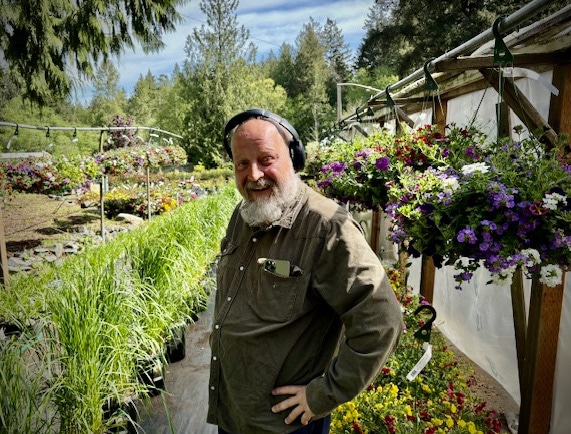
Mike Gatto is the second generation of his family to operate Raft Island Roses. Photo by Chris Phillips
Frank’s backyard hobby of hybridizing roses eventually outgrew their home on Raft Island, and in the late 1990s, he acquired four acres of property on the north side of Rosedale Street. It became the reinvented home of Raft Island Roses, which today is a winding maze of makeshift greenhouses, hand-painted signs, and long rows of plants, including, yes, some roses. If you’re looking for an elegant, high-end flower boutique, this is not it. If you’re seeking an off-the-beaten path adventure in garden possibilities, you might find it here.
Mike left his father’s family rose-growing business during the ’90s to attend college at Corbin University in Salem, Ore., where he double majored in English and education. That’s where he met his wife Pam, who today works with the children’s ministries at Chapel Hill Church. After several years in Central and Southern California, they moved back to Gig Harbor to help nurture the family business.
“This is going to sound arrogant, but that’s when the business took off,” said Mike, whose gnome-like beard, frequent chuckle, and jovial eyes make it clear that he would struggle to even pretend being arrogant.
Growing business beyond the backyard
The business grew because, while Frank started out by selling exclusively home-grown roses, Mike branched out to include other plant varieties sourced from carefully picked wholesale growers. He realized he and his father could no longer grow everything themselves. The combination of home-grown plants and select suppliers allowed them to reach new customers during a broader growing season.
Mike also learned a lot about cultivating customers when he took his show on the road. For several years, he poured his energy into the Pacific Northwest’s circuit of local farmer’s markets. He set up retail plant booths at markets in Seattle’s Lake Forest Park, Burien and other communities up and down the Puget Sound. Hard work sprouted a profitable vocation.
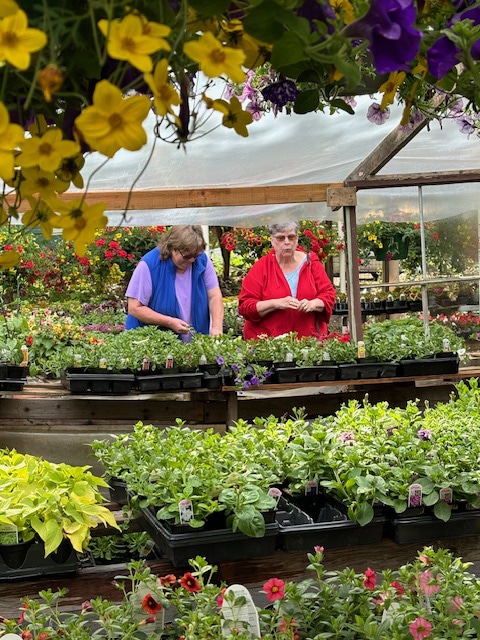
Customers shop at Raft Island Roses. Photo by Chris Phillips
“I learned a few things in that business,” said Mike. “There’s attrition — many don’t make it, and the management of markets changes all the time. My whole thing was to be different. I wanted to get your attention, be approachable, so that you would slow down enough to notice me.”
Mike said the farmer’s markets taught him how to observe people and how to interact with them in a way they could appreciate.
“Everyone has their own life experiences, and so I was studying that.”
His roadshow of farmer’s markets ended abruptly with the COVID-19 pandemic in 2020. Managers of the markets wanted to keep running events, but the business of street vending became mostly unpredictable for retailers and customers alike.
“I don’t like unpredictability,” said Mike.
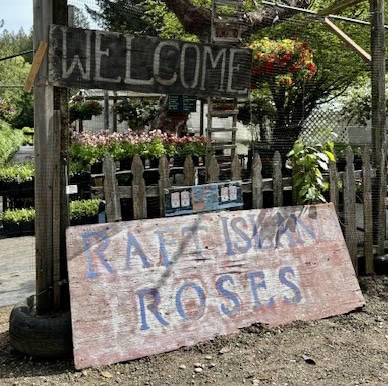
Raft Island Roses on Rosedale Street. Photo by Chris Phillips
Street markets close; other opportunities open
Exiting the farmer’s market circuit allowed him to refocus on his home turf in Gig Harbor. He bravely embarked on social media, establishing a frank and factual storytelling voice on Facebook. This led to his next phase of commercial success at Raft Island Roses. Eventually, the pandemic would create a safe zone for those who might otherwise be stuck at home on their TVs and computers.
“I was very public with everyone about our strict safety protocols. I made it clear that we were an open, outdoors environment and that we would stay away from you during shopping,” said Mike. “We went very conservative with our safety. People who were scared to go places felt comfortable coming here.”
Mike, a self-described germaphobe, said his serious approach to COVID caused some to criticize him, but he held firm. He knew he had to watch out for his now-elderly father and his older brother, who was born with Down syndrome. “The idea of my brother or father having to be isolated due to illness just horrified me,” he said.
Developing a direct voice to customers
During the pandemic, he refined his friendly but firm, no-nonsense approach to customers that remains embedded in his service culture today. “That’s when I started being more direct. If people are mean to me or my employees, they just don’t need to come here,” he said.
His caring, paternal approach with his employees is something that persists with Mike. He does not suffer fools gladly when it comes to customers who raise their voices toward his staff or come to the nursery with irrational requests.
“Ninety-nine percent of people here are good customers, but if someone is crass or unfriendly, we don’t tolerate that,” said Mike. His fertile stream of interactive updates on Facebook conveys the same good-humored but direct theme to the marketplace: Be kind or be somewhere else.
Mike also seems to have a green thumb when it comes to hiring help at the nursery. He nurtures people like he does plants. Some have come to him down on their luck or after having made errant life decisions. Whether they are punk rockers or Christian separatists, if they respect the work, Mike looks for them to grow. If they don’t bring respect to the work, they go elsewhere.
“I try to be understanding and focus on people’s strengths,” said Mike. “With young people, they may lack confidence, but if you give them responsibility and watch them, they learn to work on their own.”
Getting messy to manage growth
After chatting through a lengthy cup of decaf with Mike, I realized that gardening, much like business and life itself, requires adept problem-solving. It entails trust in human nature, and an appreciation of nature in general. It requires tolerance with imperfection.
Sometimes you need to get messy and sore to understand how to manage growth. Setbacks are a given. Sprinkler pipes break. Every plant in the garden will not flourish. Our choices rest in how to respond.
Mike understands this; it’s his superpower. He’s equal parts cultivator, educator, and counselor, whether he admits it or not. He knows how to trust people and plants, how to observe them, and how to nurture their growth. But he also knows how to move on when growth falters. He’s more motivated by making progress than by gaining validation from others — sort of like a plant.
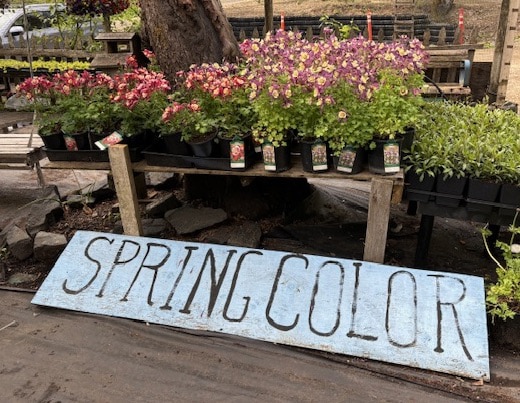
Offerings for sale at Raft Island Roses. Photo by Chris Phillips
He might try working at farmer’s markets or expand into mail-order delivery of bareroot roses. He might branch out to offer bushy hostas or a jungle of hanging baskets. When fall comes, stock up on fresh Christmas trees, wreaths, and hearty mums. Keep those wobbly wheels on the garden carts rolling throughout our May-November frost-free growing season. And take care of your people and plants at each turn.
Finding a sunnier side of gardening
Admittedly, I have spent a significant portion of my life wandering the aisles of gardening stores, tree nurseries and various plant places. It’s simply part of the pact that came with my marriage. I feign interest in many forms of greenery while intently studying a selection of gardening tools as a distraction. At Mike’s nursery, I chat with one of his young employees about how best to embellish a vintage sports car that I spotted in the parking lot. I seek out diversion amid the organic materials that enchant my wife.
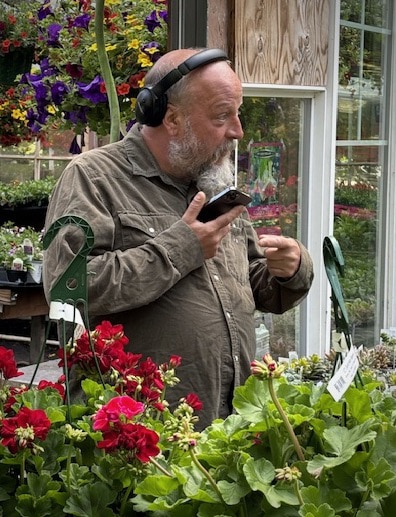
Mike Gatto at work at Raft Island Roses. Photo by Chris Phillips
After my visit with Mike, though, I confess to having a sunnier disposition toward gardening. He guided me through my own earth-bound purgatory. I am developing a healthy curiosity that stops somewhere short of passion. I no longer worry about the list of 67 tasks that the Washington State University’s master gardener program identifies on its 12-month gardening calendar. I let it go.
I am encouraged that the first line in the Farmer’s Almanac, when asked when to start planting flowers each year, is a simple declaration: “It depends …”
Don’t tell my wife, but I now look forward to my visits to the nursery just off Rosedale Street because I know more stories await me there. Who knows, come August I might even harvest a handful of cherry tomatoes. Whatever happens, chances are my sprinklers will still need to be fixed and my boots will still smell like chicken manure.
***
For your reference if the gardening passion strikes you:
- The National Gardening Association’s guide on when to plant vegetables in our region:
https://garden.org/apps/calendar/?q=Seattle+Tacoma+Ap%2C+WA&print_friendly=1 - WSU’s 12-month Master Gardener Calendar:
https://extension.wsu.edu/chelan-douglas/gardening/gardeningcalendar/ - The Farmer’s Almanac planting calendar based on zip codes for Gig Harbor:
https://www.almanac.com/gardening/planting-calendar/WA/Seattle - The Farmer’s Almanac guide on when to plant flowers:
https://www.almanac.com/when-plant-flowers


